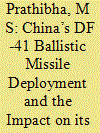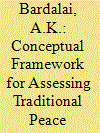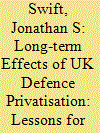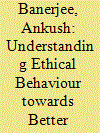| Srl | Item |
| 1 |
ID:
169487


|
|
|
|
|
| Summary/Abstract |
The deployment of the DF-41 ballistic missile in China shows that the nature of its nuclear posture is at a critical stage of evolution. On the one hand, the deployment illustrates the achievements in Chinese missile modernisation, which poses a threat to the US deterrence capacity. On other hand, it exposes the limitations in its deployment patterns. Far from the expected and seamless transition from solid to liquid fuelled missiles, China’s diversification plan of deploying the DF-41 along with new and improved liquid-fuelled Inter-Continental Ballistic Missiles (ICBMs) deployment show that its faith in the solid-based propellant missiles remains limited at present.
|
|
|
|
|
|
|
|
|
|
|
|
|
|
|
|
| 2 |
ID:
169646


|
|
|
|
|
| Summary/Abstract |
Despite decades of experience in peace operations, most United Nations (UN) operations have faced serious criticism for being unable to implement the mandate. At the same time, while the UN is in the process of establishing a clear framework for performance evaluation, as of now, there are no standard criteria to judge the performance of a peace operation. Therefore, it will be unfair to make only the peace operation missions accountable because of their inability to implement the mandate. For an objective assessment, there is a need for a conceptual framework and to standardise the success criteria. This article makes an attempt to develop a conceptual framework for evaluating peace operations. Being one of the major troop-contributing countries (TCCs), the suggested framework may help India to pitch in with its own share of contribution to the development process of the framework for performance evaluation.
|
|
|
|
|
|
|
|
|
|
|
|
|
|
|
|
| 3 |
ID:
169643


|
|
|
|
|
| Summary/Abstract |
This article argues that privatisation of defence has failed to achieve the objectives of increased competition (between producers) leading to increased choice and reduced costs (to purchasers). Instead, costs have increased, choice has decreased and much of the equipment supplied to the United Kingdom (UK) Armed Forces is now sourced wholly or partially from foreign suppliers—leaving the nation dangerously exposed to potential interferences in the supply (and replacement) of weaponry and munitions for political reasons. In effect, privatisation has replaced a national monopoly (over which the government had control) with a foreign private monopoly (over which the government has very little control). It is felt that the lessons from the UK experience may be of benefit to India which is currently undergoing similar restructuring.
|
|
|
|
|
|
|
|
|
|
|
|
|
|
|
|
| 4 |
ID:
169486


|
|
|
|
|
| Summary/Abstract |
At the heart of ethical choices lies the complex interplay between individual intentions and environmental vectors. Factors such as stress, misguided motivations and the failure to handle positional power make the issue so very intriguing. Further, ethical dilemmas are often laden with inherent individual subjectivities, making it difficult to arrive at a singularly agreeable distinction between ‘right’ and ‘wrong’. Why do individuals transgress? Why do individuals give and take bribes? Why is it so difficult to report a course mate? This article seeks to focus on the behavioural side of ethics. It investigates the behavioural realm of ethics through the application of various principles from the newly emerging field of behavioural ethics, in order to expand the individual and organisational understanding of ethics and morality in the broader context of the military paradigm.
|
|
|
|
|
|
|
|
|
|
|
|
|
|
|
|